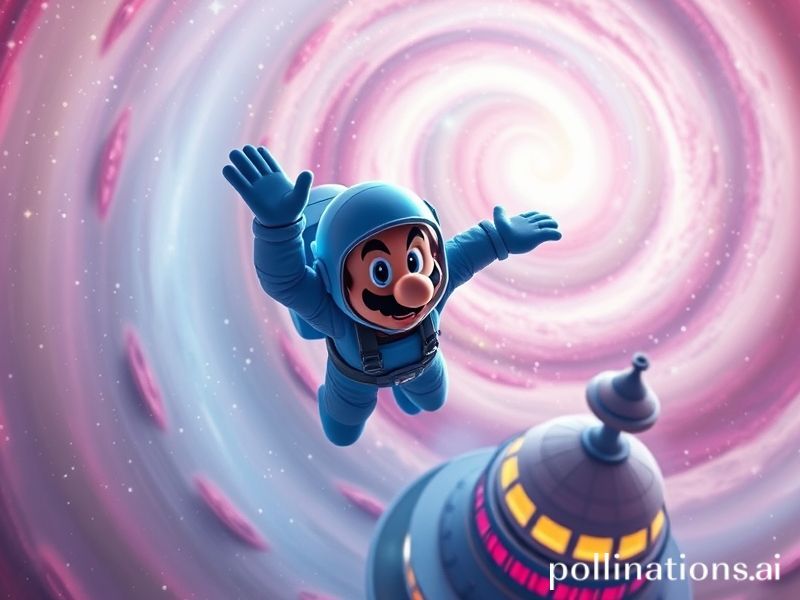Super Mario Galaxy Movie: The UN-Approved Blockbuster That’s Selling Zero-G Escapism to a Fractured Planet
The Mushroom Kingdom Goes Multilateral: How a “Super Mario Galaxy” Film Became the UN of Blockbusters
By Paolo “Warp-Pipe” Ricci, Senior Correspondent, Dave’s Locker
Rome—In the same week that the G7 couldn’t agree on a dessert menu, Universal and Nintendo quietly announced a global release slate for their still-untitled Super Mario Galaxy movie. The timing was exquisite: while diplomats in Hiroshima were arguing over comma placement in a climate communiqué, the plumber from Brooklyn—now a naturalized citizen of every multiplex on Earth—scheduled his next gravitational waltz for December 2026 in 82 territories simultaneously. If that sounds like overkill, remember that the last time humanity synchronized this many clocks we were trying to stop Y2K from deleting our bank accounts. Spoiler: the banks deleted themselves anyway.
The choice of Galaxy as source material is geopolitically savvy. Unlike the flat-earth nostalgia of the original Mushroom Kingdom, Galaxy is literally borderless—planetary shards drifting in a vacuum where passports are irrelevant and even Goombas qualify for frequent-flyer miles. That plays well in a world where “sovereignty” increasingly feels like a participation trophy handed out at Davos. Nintendo’s Kyoto headquarters, never shy about monetizing childhood trauma, has spotted a market opportunity: sell escapism to viewers who can’t afford the plane ticket, the carbon offset, or the therapy required after reading the IPCC report.
Cue the international production lattice. Animation is being rendered in Montreal (cheap tax credits, cheaper winter), storyboarded in Paris (where artistic suffering is tax-deductible), and voice-directed in Los Angeles by a man who pronounces “Raccoon Mario” as “cultural appropriation.” Meanwhile, Shigeru Miyamoto hovers over Zoom like a benevolent deity who’s read the comments section and still decided we deserve nice things. The result is a film that will arrive pre-localized in 46 languages, including Klingon—because nothing says universal joy like a fictional dialect invented to dramatize interstellar war crimes.
Of course, every utopia needs a tariff schedule. China’s regulators have already requested that Lumas—the star-shaped baby galaxies—wear slightly longer robes, lest Chinese youth confuse astral projection with political dissent. The EU is demanding that Rosalina’s backstory include a GDPR-compliant privacy notice, while the UK, in post-Brexit delirium, insists on a separate British English dub where Bowser sounds like he went to Eton. Italy, never one to miss a branding opportunity, has offered the Colosseum as a premiere venue provided the red carpet matches the national soccer jersey. The quid pro quo? A 30-second shot of Mario eating authentic Neapolitan pizza, gluten and humility intact.
All of this synergy is catnip to the merchandising complex. Lego will ship 1.2 million “Starship Mario” sets timed to land under Christmas trees the same week global defense budgets are quietly renewed. McDonald’s Happy Meals will feature gravity-defying toys that, like most international agreements, break within 48 hours. And in a triumph of late-stage capitalism, Dubai’s Mall of the Emirates is building a life-size replica of the Comet Observatory, complete with zero-G prayer rooms and a Louis Vuitton pop-up selling limited-edition Power Stars. Entry is free—provided you surrender biometric data and your first-born’s TikTok password.
Yet beneath the cross-platform razzle-dazzle lies a darker truth: the Galaxy movie is the rare multilateral project that might actually work. No one’s invading anyone; the only casualties are Toads, and they respawn. While the real world’s space programs languish under congressional stinginess and billionaire ego trips, Nintendo is crowd-funding planetary exploration one cinema ticket at a time. Each ticket purchased represents a micro-donation to the collective delusion that somewhere, beyond the Kármán line, politics stops at the atmosphere.
Will it heal a fractured planet? Doubtful. But for two hours and six minutes, the global audience will share one language: the soft ping of a collected Star Bit, the universal sigh when Mario misses a long jump. And if the credits roll over a shot of Earth—pixelated, lonely, impossibly small—maybe a few viewers will glance up from their phones and experience the most subversive emotion of 2026: common insignificance.
Until then, diplomats will keep drafting memos no one reads, and plumbers will keep saving princesses no one elected. In space, as in international relations, no one can hear you scheme.







